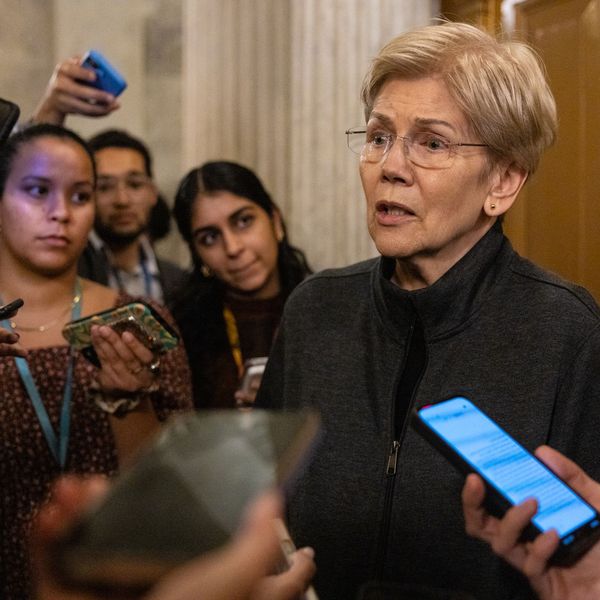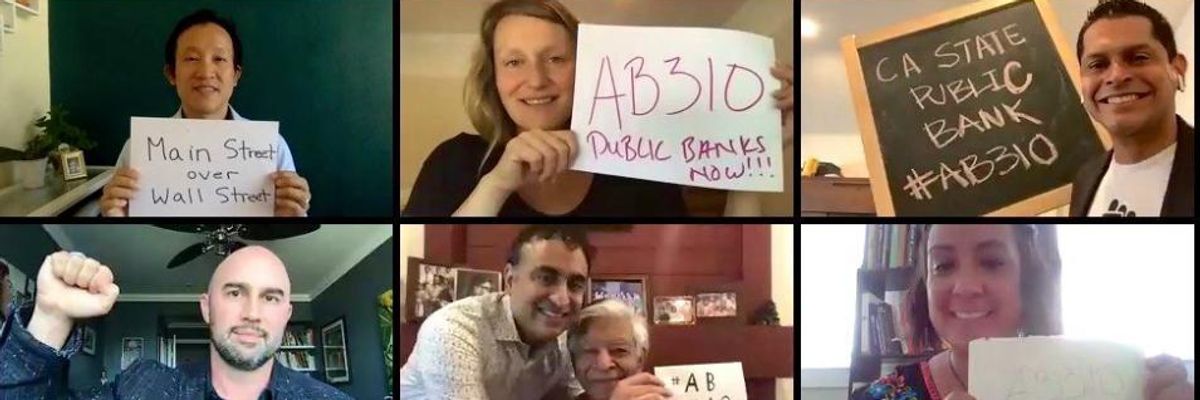In a move advocacy groups celebrated as a "historic challenge to Wall Street domination of municipal finances," a pair of California state lawmakers on Thursday unveiled legislation that would establish the nation's second publicly-owned bank and empower the institution to lend to businesses and local governments fighting to stay afloat amid the Covid-19 pandemic.
The Bank on California Bill (AB 310)--introduced by Democratic Assemblymembers Miguel Santiago of Los Angeles and David Chiu of San Francisco--would transform the state's Infrastructure and Economic Development Bank (IBank) into a public financial institution capable of efficiently distributing desperately needed funding as schools and other crucial social services struggle to cope with the coronavirus crisis and the resulting economic fallout.
"We can structure a bank that actually is accountable to the people and does what the people want it to do."
--Assemblymember Miguel Santiago
The bill comes less than a year after California Gov. Gavin Newsom signed into law the Public Banking Act, a measure also authored by Santiago and Chiu that allowed the state's cities and counties to set up publicly-run banks. North Dakota is currently the only state in the U.S. with a public bank.
"We already have an IBank, and it already has the purpose to help the California economy--let's restructure it into a state bank and take 10% of the money California already holds in its checking account and let's help Main Street," Santiago said during a virtual press conference Thursday.
"We can structure a bank that actually is accountable to the people and does what the people want it to do," Santiago added. "We can help small businesses, we can reimagine what banking looks like and actually invest in affordable housing, we can look at local infrastructure like parks."
Chiu stressed that establishing a state-run bank would dramatically reduce California's reliance on "outside for-profit actors."
Trinity Tran, co-founder of the California Public Banking Alliance and Public Bank LA, praised AB 310 as a necessary step to "mobilize state resources, extend credit to the underserved, and keep California's dollars at home where they are most urgently needed."
"Times of crisis are when change happens--to fuel California's economic recovery, we need a bank designed to stabilize the economy and invest back into our communities," said Tran.
"Times of crisis are when change happens--to fuel California's economic recovery, we need a bank designed to stabilize the economy and invest back into our communities."
--Trinity Tran, California Public Banking Alliance
The creation of public banking options has long been a goal of progressives seeking to limit the power of Wall Street institutions and create a more equitable, less predatory financial system.
On Wednesday, the Unity Task Forces appointed by presumptive Democratic nominee Joe Biden and Sen. Bernie Sanders (I-Vt.) voiced support for "efforts to guarantee affordable, transparent, trustworthy banking services for low-and middle-income families, including bank accounts and real-time payment systems through the Federal Reserve and easily accessible service locations, including postal banking."
Paulina Gonzalez-Brito, executive director of the California Reinvestment Coalition, called AB 310 a "game-changer" in the movement to usher in a more just economic system.
"If California is serious about addressing racial and income inequities," said Gonzalez-Brito, "we must create a banking system that centers people not profits."



